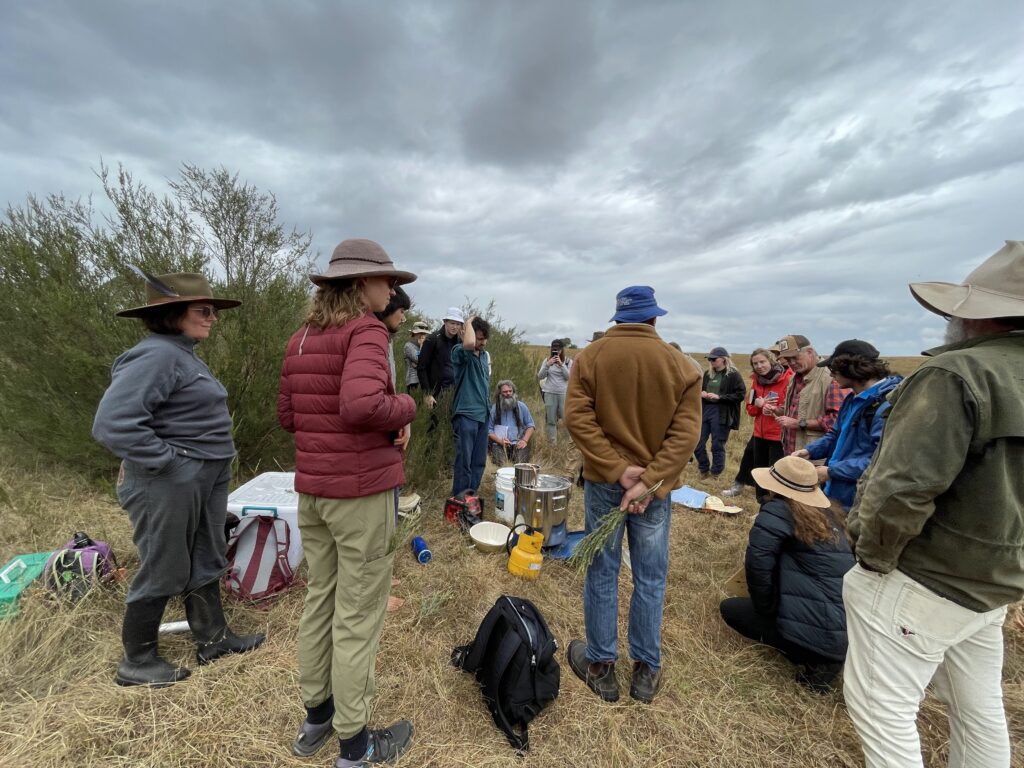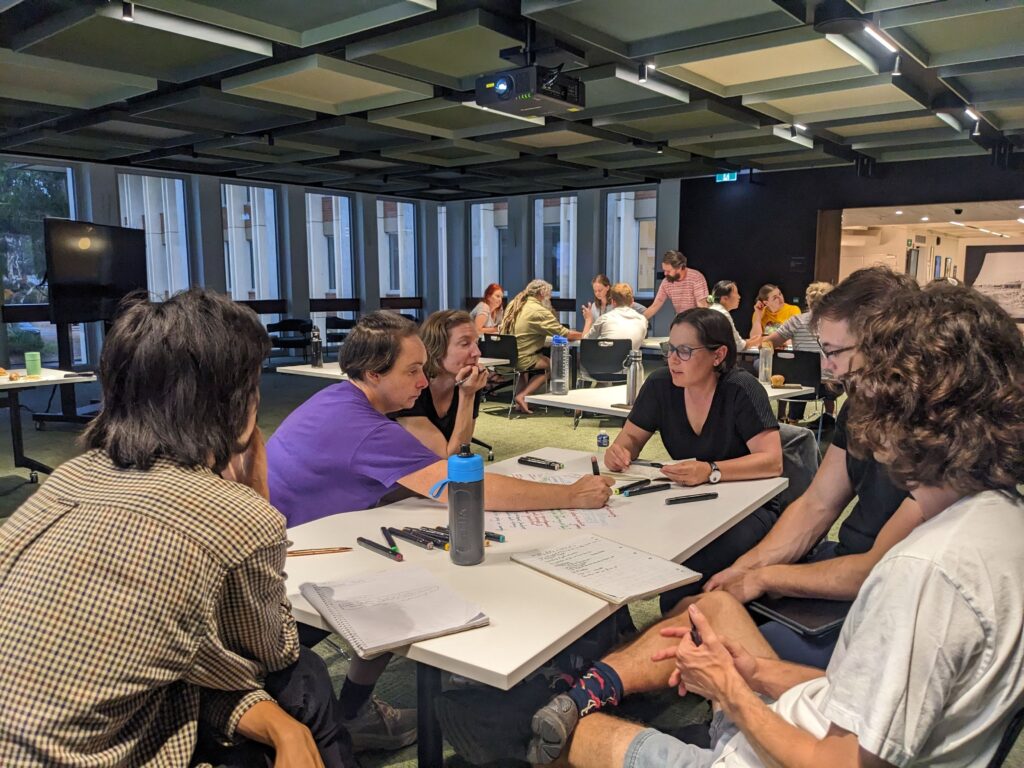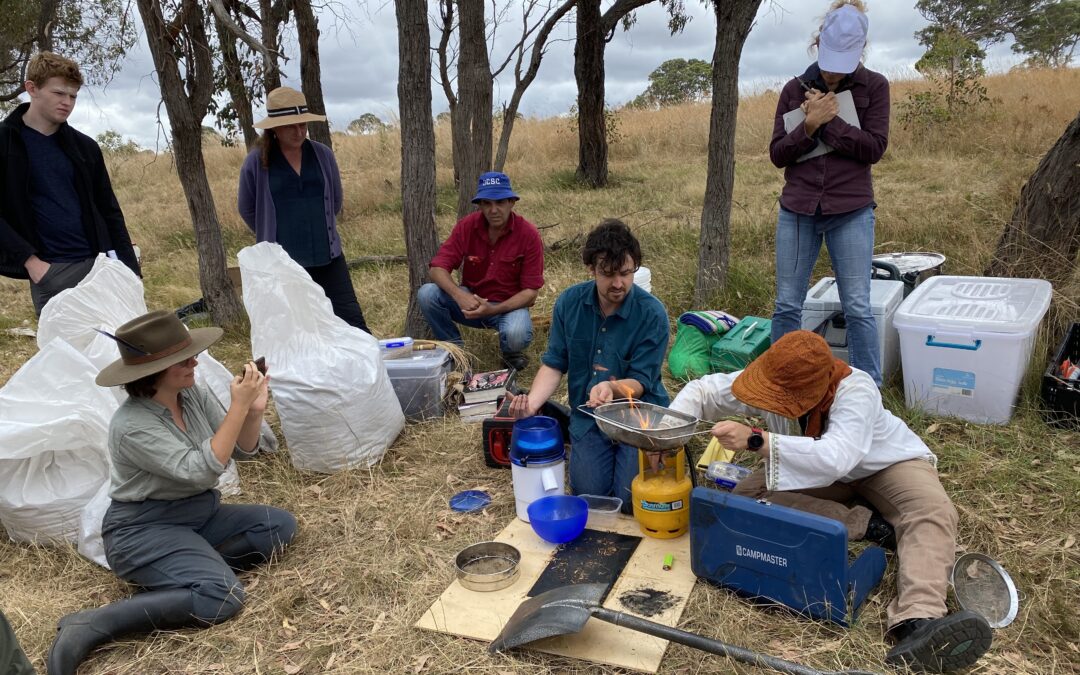Pictured: Industry professionals and university students at the 2023 Local Design Summit held on Ngunnawal and Ngambri Country.
The cultivation of native grains through careful land management was once central to Aboriginal life. However, following colonisation, the shift to European foods and farming methods damaged native grasslands and reduced biodiversity.
At Nguurruu farm, 40 minutes north of Canberra, Murray Prior is working with Ngambri custodians to implement regenerative farming practices and revive native foods and land management. Farming practices at Nguurruu are informed by Indigenous knowledges and seek to restore biodiversity and reverse ecological damage.
The second iteration of the EWB ACT Chapter’s ‘Nguluway’ Local Design Summit, held earlier this year in collaboration with Nguurruu farm, gave university students and industry professionals firsthand insight into regenerative farming practices on Country.
Year two of the Summit
The Local Design Summit is an immersive 1-2 week learning experience, allowing participants to collaborate with First Nations peoples to design, build and work on Country. Through workshops and site visits, the Summit highlights the importance of local community engagement, cross-cultural awareness and teamwork.
The 2023 EWB ACT Chapter-led Summit took place on the Australian National University’s Acton campus and Nguurruu Farm, where participants were hosted by co-custodians Paul Girrawah House, a proud Ngambri-Ngurmal (Walgalu), Pajong (Gundungurra), Wallabollooa (Ngunnawal) and Erambie/Brungle (Wiradyuri) man, and Murray Prior.
The theme for the 2023 ACT Chapter Local Design Summit was ‘Nguluway’, a name given by Paul Girrawah House, meaning ‘meeting each other’. Over the three phases of the Summit, participants learned about sustainable development and Indigenous knowledge and collaborated on potential designs and solutions.
The ACT Chapter’s first Local Design Summit in 2022 first established relationships with Nguurruu farm and Gungarri men Dan Ganter and Warren Saunders, both involved in the native grain industry. The 2022 program initiated a number of design projects such as a vibrating seed cleaner.
Upon the suggestion of Murray Prior and Paul Girrawah House, the second summit expanded on this initial work to spark Indigenous-led innovation in areas like native grains and foods. Held in January at the time of the native grains harvest, the summit facilitated co-design and two-way learning between settler and Ngambri-Ngunnawal participants.
On Ngunnawal and Ngambri Country

Local Design Summit participants on Ngunnawal and Ngambri Country.
The first phase of the summit was held at ANU and involved a series of workshops, where participants learned about sustainable and holistic development and Country-centred Design Theory.
Participants then attended a site visit at Nguurruu farm, receiving a Welcome to Country from four generations of the House family, including a smoking ceremony and the opportunity for the women to dance alongside Aunty Matilda House. The site visit brought together EWB participants, the Ngambri mob and special guests from the ANU Bandalang Design Studio and Soils for Life for a day focussed on reviving native foods and land management.
Throughout the day, participants attended onsite workshops on reviving the traditional grain economy and adapting ancient bush medicines to modern uses. At the end of the site visit day, participants shared a ‘Native Grains feast’ which celebrated local foods and ingredients, and heard talks given by owner Murray Prior and others.
Hackathon day

Local Design Summit participants during the hackathon held at ANU.
Following time spent on Country at Nguurruu farm, participants reconvened at ANU to reflect on the site visit and brainstorm ideas on native grains and land management, exploring possible designs and solutions which they presented back to the group. During the hackathon day, participants were able to consult and co-design with Dan Ganter (Gunggari man) and Karmen, both deeply involved in the native grain industry.
Ideas included a new design for a native grains collection bag to assist harvesting and a tool for increasing awareness and promoting the supply of native flora. Participants also explored a potential process for fair, Indigenous-led commercialisation of native products, and a business opportunity to encourage knowledge, growth and use of native plants.
“Start reconciliation practices today, not tomorrow”
EWB ACT Chapter Louise Bardwell reflects on her experience organising and delivering the Chapter’s second Local Design Summit:
“Tyson Yunkaporta wrote how “at low levels of knowledge there is only difference across cultures but at high levels there is common ground.” He called for an end to culture as being a “tokenistic add-on,” advocating for a path forward where we learn “through culture, not just about culture.”
One of the greatest things I have learnt across this journey of designing the Local Design Summit with my EWB ACT community is to stop worrying about doing it wrong. Coming from a space of well intention, you can easily worry yourself into doing nothing at all rather than giving it a go and maybe making a few mistakes along the way. With the support, encouragement, and experience of my EWB ACT peers, we were able to take a community approach to unlearning and relearning, together giving it a go to see how we could design and run an immersive two-way learning experience with and for First Nations Peoples on our local Ngunnawal and Ngambri Country.
The process was highly iterative, and we certainly didn’t always get it perfectly right, but the important thing was that we were doing something, and we were doing it together. Having the opportunity to form relationships with such generous people like Murray Prior, Dan and Warren Ganter and Paul and Matilda House made me appreciate how important it is for us all to start reconciliation practices today, not tomorrow.”
Next steps for the Local Design Summit
The EWB ACT Chapter is currently organising a two-part design and prototyping session to problem solve and workshop ideas to support the growth of the native grains and seeds industry. As a recipient of the RS PRO / EWB Student Sustainability Design competition, the EWB ACT Chapter will use donated RS PRO Products from RS Components in the sessions. The sessions will also be guided by the knowledge and expertise of Warren Saunders and Dan Ganter.
The design and problem solving session will run in June 2023 and the prototyping session, supported by the ANU Makerspace, will run in August 2023. If you live in ACT and are interested in attending, please email the ACT Chapter at act@ewb.org.au. You can also keep up to date with their events by following their Facebook page.


